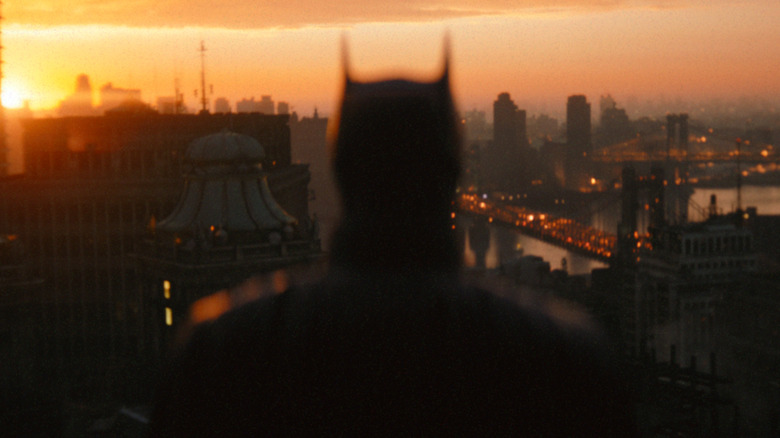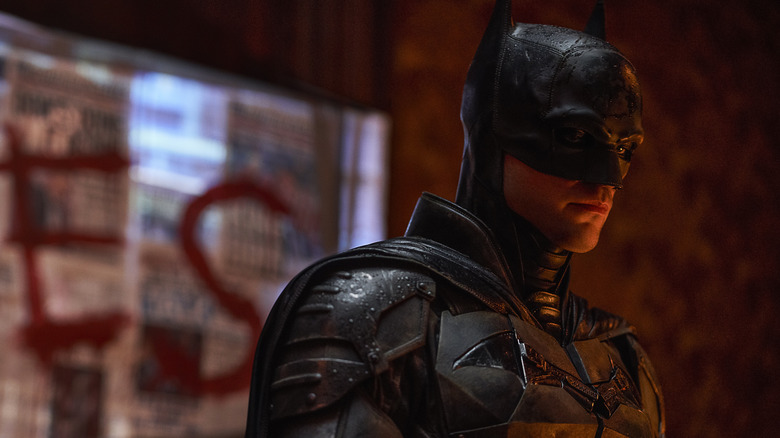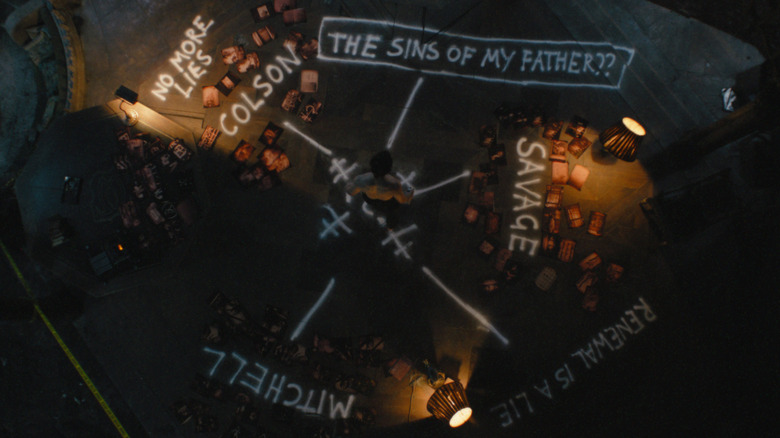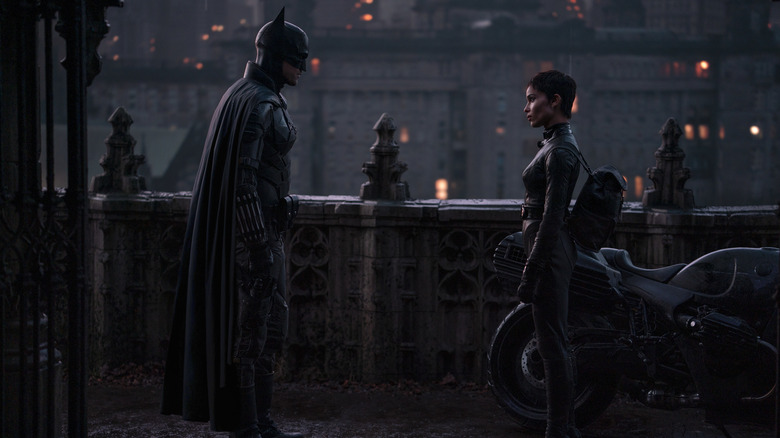The Batman Ending Explained: Can Gotham Be Saved?
It's time for the Dark Knight to rise yet again as Matt Reeves' "The Batman" arrives in theaters this week, bringing us a new, moody Caped Crusader. Robert Pattinson slips on the cape and cowl to play an emotionally stunted Bruce Wayne who mopes around his cave by day and takes to the streets to fight crime by night. As "The Batman" begins, Batman has been active in Gotham City for two years — but he hasn't had much of an impact on stopping crime. Sure, petty crooks are scared of the Batman, but that's not keeping Gotham safe. And as "The Batman" unfolds, Batman learns that small-time hoods are the least of Gotham's worries. There's deep-seated corruption lurking within the halls of power, and it goes deeper than Batman could've even guessed. Meanwhile, a serial killer known as the Riddler (Paul Dano) is stalking the city, targeting people of power with the hopes of shining a light on the duplicity that runs rampant among Gotham's elite.
So how does it all shake out for "The Batman"? Can he save Gotham? And how does it all end? Never fear — I'm here to give you the answers. Beware of massive spoilers for "The Batman" from here on out.
No more lies
As his mission to stamp out crime in Gotham continues, Batman has only a few allies. He has his trusty butler Alfred (Andy Serkis), although he keeps him at arm's length because, having lost his parents as a child, he's wary of ever getting close to anyone. Then there's Jim Gordon (Jefferey Wright), one of the few honest cops in Gotham, and seemingly the only cop who supports Batman. There's also Selina Kyle (Zoë Kravitz), a thief and small-time drug dealer who works at the Iceberg Lounge, a criminal hot-spot owned by the Penguin (Colin Farrell).
Meanwhile, the puzzle-obsessed Riddler has begun bumping off people of power, including Gotham's mayor and police commissioner. The murders are grisly, but the killer also leaks info to the press that his victims were wildly corrupt. This opens Batman's eyes a bit as he begins to realize the real criminal element in Gotham isn't the two-bit crook robbing a liquor store. It's men of power who use that power to line their pockets while keeping the rest of Gotham destitute.
And Batman, aka rich kid Bruce Wayne, is more connected to all of this than he thought. The Riddler reveals that Bruce's father, Thomas Wayne, a mayoral candidate before his murder, wasn't the squeaky clean figure Bruce thought he was. In an attempt to shield his wife, Martha, from scandal, Thomas turned to Gotham crime figure Carmine Falcone (John Turturro) to help intimidate a Gotham reporter writing a story about Martha's stay in a mental institution. We eventually learn, via Alfred, that Thomas just wanted to scare the reporter, but that really makes Thomas sound like the most naive man who ever lived. Because sure enough, Falcone went ahead and murdered the reporter in order to gain leverage over Thomas. When Thomas threatened to expose Falcone, he and Martha ended up murdered. Does that mean Falcone had the Waynes killed? Maybe, maybe not. Alfred has no proof of this, but it sure seems that way.
As for Falcone, he pretty much runs the city. Everyone is in debt to him, and he's survived for so long by ratting out his enemies while he maintains power. The cops, the elected officials, pretty much anyone with any power in Gotham, does what Falcone tells them. And no amount of Bat-punches seems able to change that. Batman needs to do more than just chase down thieves and gang members. He needs to go after the rich and powerful.
While the focus is on Batman, Selina is connected to all of this, too. She's Falcone's daughter, and she's trying to find her missing friend, a woman who had an affair with the mayor. Selina soon finds out that her friend is dead — murdered by Falcone, who tries to then murder Selina, his own daughter. Falcone is apprehended by Batman, but never makes it to prison. Instead, he's gunned down by the Riddler, who really has good timing for these sorts of things.
Gotham under attack
This all ties into the film's portrayal of Batman, who is still learning as he goes along. Sure, the Riddler — a full-blown murderer — is a serious problem. But Gotham's problems also stem from the rich and powerful men who have run Gotham into the ground in order to make themselves even richer. Eventually, after the body count has risen, and after Batman has solved a series of riddles with Gordon's help, the Riddler is captured.
Here, Batman (and the audience) learn more about this mysterious figure. He ends up being a kind of warped reflection of Bruce Wayne. Like Bruce, the Riddler is also an orphan. But while Bruce got to spend his parentless youth living in wealth and luxury, the Riddler was stuck living at underfunded orphanages where rats would gnaw on the faces of kids and where, every winter, at least one baby would die due to the cold. Bleak stuff, folks!
And while the Riddler is now incarcerated in Arkham Asylum, he's not done teaching Gotham a lesson. It's election night in the city, and the newly-elected Bella Reál (Jayme Lawson) has promised to clean up the city. But the Riddler doesn't buy it. He's built up a small but fervent following online, and he's called on his sicko followers to mask up and attack. Just to make things extra dangerous, the Riddler has also planted bombs along the city's seawall. As the election night celebrations commence, the bombs blow, and Gotham floods, forcing countless people into Gotham's own version of Madison Square Garden for safety.
At this point, the Riddler's minions, who are all dressed in Riddler disguises, attack the trapped citizens, shooting guns into the crowd. A massacre seems imminent, but thankfully, Batman shows up. And, with a little help from Selina and Gordon, the Riddler's goons are defeated. At Arkham, the Riddler — who thought of Batman as a kindred spirit — is crushed. But not to worry, he has a new friend: a mysterious figure (Barry Keoghan) locked in the cell next-door. Who is this mystery man?! Why can't we really see his face?! And why does he keep talking about clowns?! Gosh, we'll never figure this out! (It's the Joker.)
Batman begins, again
After the big action-packed climax, "The Batman" wraps up with a series of epilogues that both serve to conclude the story and set up things to come. To be clear: none of this feels like a cheap, hollow attempt to immediately set-up a sequel. While I have no doubt that a sequel will be made, if one never happened, "The Batman" would still feel like a complete story. And that's pretty refreshing these days when all superhero movies feel incomplete; as if they only exist to give birth to sequels.
The clean-up in Gotham has begun. Bella Reál, who was shot during the big ending but survived, still promises to fix the city. Still, there are plenty of rogue elements out there — like the Penguin, who is clearly going to swoop in and try to be the new crime boss of Gotham now that Falcone is dead. Batman, having saved the day, is a much more welcomed presence than he was before. And his mission continues — although a part of him would clearly like to run off with Selina, who is leaving Gotham for nearby Blüdhaven. But the Batman can't just throw in the towel and give up. He has a mission to save Gotham, and Gotham needs saving, now more than ever.



